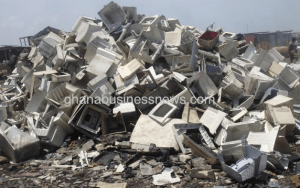E-waste in Ghana – Authorities deny dumping

E-waste dumping is a major problem in Ghana, but Ghanaian authorities deny there is any amount of dumping going on in the country.
Ghana’s Environment Ministry and Environment Protection Agency (EPA) all insist what is going on in Ghana is not dumping.
Meanwhile, large numbers of obsolete computers enter the country through Ghana’s ports on a daily basis.
Investigations at the Tema Port show that even Pentium Two computers are being imported into the country. But IT experts say Pentium Two computers can not be of much use to any economy that intends to use ICT to facilitate growth.
They argue that apart from the fact that most of the software that are being written these days can not run on these versions of computers, they do not have the capacity for high volume industries. These computers are likely to end up in the waste stream sooner than later.
Mr. Kofi Dadzie, of Rancard Solutions, an ICT company says these types of computers are obsolete and would not help the country in its quest for development.
He said, “applications these days are built to meet computing power, and why should we go for low computing power to compete?”
Mr. Dadzie said importing low power 400 MHz and 500 MHz computers into the country is not advisable for productivity. He added that it is possible that people who are looking for opportunities to dump old computers might be responsible for exporting such computers into Ghana.
The Agbogbloshie scrap yard and dump site in Accra are equally important evidences of dumping.
The e-waste problem in Ghana appear to have caught some attention following an article I wrote in June 2007 to inform the world about the possible dangers that Ghanaians and the country’s environment could be exposed to if the problem is not properly handled.
But Ghanaian authorities do not appear to see the problem as a serious one that requires urgent attention. While the Environment Agency (EA) of the UK is investigating some recycling companies in the UK on suspicion of dumping e-waste into Ghana, Ghanaian authorities are unaware of the on-going investigation.
Speaking to me in a telephone conversation, Ghana’s Deputy Minister of Local Government, Science and Environment, Maxwell Kofi Jummah, says there is no dumping of e-waste in Ghana. He said “there is no dumping of e-waste in Ghana.” And when I asked if he was aware of the Agbogbloshie dump site, he insisted, “they don’t throw computers there, if you go to Agbogbloshie you will not find even 10 computers there.”
He also told me he is not aware of the UK government’s investigation of the matter.
Mr. Jummah also said a law will come into effect in two years that says all used electronics equipment such as fridges, TVs and Air Conditioners that are imported into Ghana must have energy efficiency labels on them. He said people would also be given coupons to trade their obsolete gadgets with energy-efficient ones.
Asked if the law covers used computers, he said, “I am not sure if used computers are covered by the law.”
Meanwhile, Computer Aid International, a UK based Charity which distributes refurbished computers to developing countries, say they are hopeful that the EA would contact the Ghanaian authorities as part of their investigations.
Speaking to me on the phone, Louise Richard, the CEO of Computer Aid International, which also put pressure on the UK government to investigate the dumping of e-waste in Ghana following a Green Peace International report on the problem which was published on August 5, 2008, said there is evidence of e-waste dumping in Ghana.
Ms. Richard said the evidence of e-waste dumping in Ghana is contained in the very detailed reports which the Green Peace International and Consumers International have produced.
Both the Green Peace and Consumers International reports have documented videos, photographs and lab reports to show the gravity of the problem in Ghana.
Depending on who is speaking on the issue, it appears there is no concerted government approach to resolving the issue.
Speaking at a Climate Change meeting in Accra, August 21, 2008, Ghana’s environment Minister, Kwadwo Adjei Darko made an appeal to developed countries to stop dumping e-waste in Ghana.
He said old computers are being imported into Ghana and these importations have resulted in hazardous e-waste in the country.
He appealed to exporting countries to stop using Africa as a dumping ground.
Indeed, even though the Public Relations Officer (PRO) of the EPA, William Abaidoo announced the formation of a committee to draft policy to deal with the problem not much has happened since the announcement was made.
In an interview he granted Ghana’s leading daily newspaper Daily Graphic, he said the EPA was developing guidelines to regulate the importation of used electronic gadgets into the country.
The interview published in the April 25, 2008, issue of the newspaper quoted him as saying that the guidelines would serve as a standard for what “we want to have and receive as a country in terms of electronic wastes.”
But when I called him to find out if the committee has been formed he instead referred me to another officer.
And he was also unaware of the UK government’s investigation of the issue in Ghana.
He also asked me to show him any evidence of e-waste dumping in Ghana. “If you know anywhere e-waste is being dumped in Ghana, show that to me and the EPA will act.”
Clearly this remark shows a denial of the incidents of e-waste dumping in Ghana.
While the debate goes on, the eight-year olds, teenagers and adults who work to survive by dismantling obsolete computers without any protective gear and burn the cables in open fires to extract the copper, would continue to be at risk in as much as they expose Ghana’s environment to risk of contamination from lead, cadmium, polybrominated flame retardants and other hazardous chemicals.
By Emmanuel K. Dogbevi
Email: edogbevi@hotmail.com
